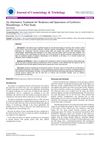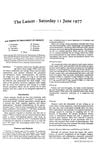copper gluconate
Research
20 / 1000+ resultsresearch Copper-Doxorubicin as a Nanoparticle Cargo Retains Efficacy with Minimal Toxicity
Copper-doxorubicin nanoparticles effectively treat tumors with less toxicity.
research Mineral Malnutrition Following Bariatric Surgery
Bariatric surgery can cause serious mineral deficiencies, requiring better patient education and monitoring.

research Acute Dermal and Ocular Irritation Testing of Rice Bran Supercritical CO2 Extract (RB-SCE) and 0.5% RB-SCE Essence Product
Rice bran extract caused moderate skin irritation but no eye irritation, while a diluted essence was not irritating to skin and only slightly to guinea pigs.

research An Alternative Treatment for Weakness and Sparseness of Eyebrows: Mesotherapy, A Pilot Study
Mesotherapy might help make eyebrows thicker and darker for some people.

research Analysis of Serum Zinc and Copper Concentrations in Hair Loss
People with hair loss, especially those with certain types, have lower zinc levels, and zinc supplements might help.

research The Therapeutic Effect and Changed Serum Zinc Level After Zinc Supplementation in Alopecia Areata Patients with Low Serum Zinc Level
Zinc supplements increased zinc levels in some hair loss patients but didn't significantly improve hair growth.

research The Role of Micronutrients in Alopecia Areata: A Review
People with alopecia areata often have lower levels of vitamin D, zinc, and folate, but more research is needed to understand if supplements can help treat it.

research Gray Hair: From Prevention to Treatment
Gray hair can potentially be managed or reversed with treatments that boost melanin production and address nutritional deficiencies.

research Innovative Uses for Zinc in Dermatology
Zinc can be a helpful secondary treatment for certain skin conditions, but more research is needed to guide its use.

research Jaw Wiring in Treatment of Obesity
Jaw wiring helps with weight loss but long-term habits are needed to keep it off.

research Zinc in Skin Pathology and Care
Zinc can help with some skin problems, but its effectiveness varies depending on the condition.

research Oral Zinc Sulphate Causes Murine Hair Hypopigmentation And Is A Potent Inhibitor Of Eumelanogenesis In Vivo
Oral zinc sulphate reduces dark hair color in mice.

research Tamoxifen-Induced Female Androgenetic Alopecia in a Patient with Breast Cancer
Tamoxifen caused hair loss in a 52-year-old woman.

research The Diagnosis and Treatment of Iron Deficiency and Its Potential Relationship to Hair Loss
Iron deficiency may be related to hair loss, but there's not enough evidence to recommend iron screening or supplements for all hair loss patients.

research Zinc Therapy in Dermatology: A Review
Zinc is effective for treating various skin conditions, including warts and acne.

research The Role of Vitamins and Minerals in Hair Loss: A Review
Some vitamins and minerals like vitamin D and iron can help with certain types of hair loss, but more research is needed for others.

research Nutrition and Hair: The Role of Nutrients in Hair Health
Eating the right nutrients can improve hair health, but taking extra supplements usually doesn't help unless you have a deficiency.

research Zinc Deficiency and Its Management in the Pediatric Population: A Literature Review and Proposed Etiologic Classification
Zinc deficiency in children can cause skin issues and can be serious if not diagnosed and treated properly.

research Acquired Zinc Deficiency Dermatosis in Humans
Zinc supplements can resolve skin issues caused by zinc deficiency.

research Toxic Epidermal Necrolysis
Toxic epidermal necrolysis is a severe skin reaction often linked to drugs, requiring careful medication use and supportive care.
